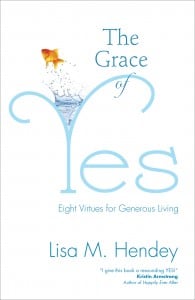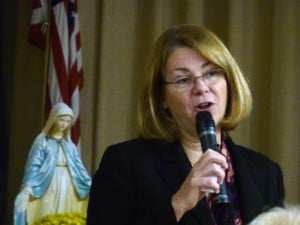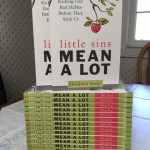You might call her an “accidental innovator”. When Lisa Hendey tried to digitally explore better ways to be a Catholic while raising a family, she couldn’t find what she needed. So she created it. As she writes in her new book, The Grace of Yes, “I went looking for answers, and when I didn’t find them online, I bought a domain name and some of those For Dummies books about the Internet and launched Catholicmom.com.”
The rest, as the saying goes, is history. Since its inception, CatholicMom.com has become the one-stop spot for Catholic parents looking for information on parenting, religious education, family devotions, new books, games and movies and their family-appropriateness, and even fast, nutritious recipes. It has helped launch the careers of writers — both Moms and Dads — who might never have explored and developed their gifts, or found a steady readership, without the opportunity Hendey’s site opened for them. It has surprised Hendey, herself, with a travel and speaking schedule that would seem to rival only a politician in full-campaign mode, except she is campaigning for Christ, and for the family.
From the simple act of starting a website, with no particular expectations beyond a creative and productive hobby, Lisa Hendey has found her life’s “work”, and it is wholly of-a-piece with what she will tell you is her first and most fundamental calling: to take the lessons she has learned in the school of love to which Christ Jesus has led her — that being marriage and the family — and apply them to the world, and everyone she meets.

That sounds like an absurd Pollyannaism, and yet in meeting Hendey one is immediately struck by the power of her authenticity. She loves, and she really means it. In her new book The Grace of Yes: Eight Virtues for Generous Living , she gives a deeply personal glimpse into the generative power of love — how by being open to love, and to giving it away, one is gifted with more love. After a while, love powers itself, running on the energy of one small word, uttered in faith: yes.
In your book, you demonstrate the power of “yes” to small things and very big things. Can you talk about a time when you said “yes” to something “small” and it became something big?
I have to say that the immediate answer which comes to my mind is my “yes” to starting CatholicMom.com! What began as a hobby on my kitchen table has blossomed into my life’s work. When the website began, I thought I would work on it for a few months and then move along. I was looking for answers to major faith issues–how to be the best Catholic mother I could possibly be. I’m honestly still seeking those answers every day. So the daily “yes” to this work is affirmed every morning. I’ll share that there have been many moments when I’ve wanted desperately to quit. The work we do in the New Evangelization is often challenging and can even at times do damage to us spiritually if we don’t seriously guard our prayer lives. In the past few years, my “Yes” to CatholicMom.com has evolved as I’ve seen my role happily become providing a venue for other writers, many of whom are just discovering their passion for writing for the very first time. I don’t know how long God will have me doing this little work, but I am joyful for every moment, even when the work is exhausting or feels daunting.
What about a time when you said “yes” to something that seemed huge but ended up being kind of small?
This is a challenging question! I’ll answer it by saying that becoming a mother felt “huge” when I learned that Greg and I were going to have Eric, our first son. I wasn’t ready to give up my “me” stuff and saying “yes” to motherhood felt like a huge imposition, a sacrifice of who I believed myself to be. I learned rather quickly that what I believed to be a yes to a “huge sacrifice” ended up being one of those “my yoke is easy and my burden light” moments. Now I see that my yes to embracing the joy of motherhood was in every way a gift.
Big or small, how does it all help you to appreciate the reach of a single, “yes.”
It’s sometimes easy to look back and say, “Ah-ha! That’s what God had in mind…” when we get through the steps of a problem or situation that seems filled with craziness. This is why I am trying to train myself to “err on the side of generosity” by giving a well-discerned “yes”. So many times I’ve done so, against my initial will, and seen incredible blessings flow from a single “yes”. This often happens when I think I’m saying “yes” to doing a favor for someone else. What begins as me thinking that I am helping someone else, ends up with me recognizing that I am the one who has been helped in the interaction! I’m not sure that this makes sense to anyone but me, but it’s happened frequently enough for me to see a great pattern and to realize that helping others and living generously comes with an abundance of blessings.
You make yourself very vulnerable in the book by sharing deeply personal moments in your life, and this necessarily brings your husband and your sons and other family members into it. That can always be frightening; how did they handle it?
My husband and sons have grown up with a blogging wife and mom, so this has been a “thing” for years now. When the boys were little they used to say, “Blog this mom!” and then do something cute or outlandish. Now they’re more likely to say, “No photos, mom!” as if I were the paparazzi! :) But we’ve all learned a lot over the years — especially me — about sharing certain parts of our lives while keeping many other parts private. In this book, I speak a lot about Greg’s (my husband’s) faith journey, but more so about it through the prism of my own. I speak much less about my sons in this book, and that was by design. Both are young adults with lives of their own. I would never write about anything that could be embarrassing to them or detrimental to them publicly.
But all three of my men are the foundation for my vocation as a wife and mom, so to not share about myself in relation to them would take a lot of heart out of this book.
I’ll share that Greg has been incredibly supportive of all of my work, this book included. I couldn’t do what I do if he weren’t, and I’d quit it all tomorrow if he asked me to. The portions of the book that deal with Greg’s conversion to Catholicism and with our relationship, especially my struggles with that “process” and his journey, have been some of the most commented upon parts of the book by readers. I believe what our family has faced and continues to face reflects many in society today.
Does saying “yes” mean you are completely trusting and content, or does fear still have a place in all of that?
Fear absolutely still has a place, perhaps even more so now that I’m becoming more “mature”. “Yes” often means a risk. For example, a “yes” to writing this book The Grace of Yes, in this very personal way, felt like a huge risk. I feared exposing my own weaknesses and foibles. We who work in the spiritual realm sometimes fear letting our own lack of sanctity show in public. I made the decision that for me to write this book honestly, I had to overcome those fears of looking bad, of being perceived as “not enough” by people I respected. I still fear this, but I’ve made a concerted effort to overcome my personal hesitation because I feel so convicted about the message of this book. You and I have the capacity to accomplish amazing things when we cooperate with God’s plan for our lives. When we refuse to do so out of fear of failure or rejection, we place limits around God’s capacity to work in and through us. I’m not talking about heading into things without discernment when we feel fear. Prayer definitely needs to be part of our discernment process before giving our “Yes”. But I also believe that we cannot let fear paralyze us.
Your own career is witness to that message. You write about eight virtues that enhance our faith, and our ability to keep saying “yes.” Which is the virtue that most personally speaks to you, or instructs you?
Each of the eight I discuss in the book speak to me. I’ll say that the virtue of “generativity” discussed in the book probably is the one that comes most easily for me at this point in my life. While I still struggle to fully live the “Agape love” discussed in the chapter on relationships, I find myself increasingly devoted to generativity in my relationships. If you’re asking which virtue most “instructs” me, I would have to say it’s the work I did in the book on humility. This is something I struggle with daily. I’m also continually discovering the deep connection between humility and forgiveness, including forgiveness of ourselves. I’m very much still a work in progress when it comes to the virtue of humility!
It’s interesting that you cite generativity as the virtue that comes most easily for you. I read that whole chapter feeling very challenged by it, particularly within the context of family, because — and it scalds me to say it — I feel like sometimes I am least generous towards my family because I know I can get away with it! For you, the family is where you find your best self at loving, and you write about this beautifully. How can an exploration of the virtue of generativity contribute to the Church’s year-long discussion on the Family, which will culminate in the World Meeting of Families in Philadelphia and then the concluding synod, in Rome?
In that chapter, I include a quote from Pope Francis which so aptly demonstrates to me that he “gets” the importance of this concept and that it often fuels the way that he interacts with people. We see him being very relational, and we hear him calling us to true encounter with those with whom we journey towards Christ and his Church. Certainly, the family — the Domestic Church — seems to me to be at its heart generative. But it is also in the raising of our children to be independent, unique individuals that we can “lose” them. I’m honestly still very much in the learning phase about what it means to parent young adults. I wouldn’t deem in any way to call myself an “expert” on being a mom at any phase of life, and especially not at this one! But sharing my efforts to love and to serve our family, even in my failures, touches a cord I think with others who are trying to do this in our own homes.
To be honest, your question about how this topic of generativity contributes to our current conversation on marriage and family challenges me. I think in many homes, parents are struggling because they have devoted themselves for decades to raising children in the faith, to know and love God, and they see their efforts being rejected or lived out in ways that they either don’t understand or don’t agree with. For Catholic parents, as we journey to the font with our children, we vow to raise them in the faith. So being “generative” for a Catholic parent is most often squarely focused on leaving a “legacy” of faith and belief for our children. For those who do this and go on to have their efforts rejected, they can feel failure, depression and also serious concern for their children.
I do believe that for both the sake of our families and for the sake of our Church, we must engage in honest, open dialogue about what “Domestic Church” means in ALL phases of family life. And generativity definitely plays into that.
Okay, with that answer in mind, imagine you have an opportunity to present a copy of your book to His Holiness — let’s say you just run into him coming back from lunch — what two lines from The Grace of Yes would you underline for his attention?
Wow, brilliant question! And a hard one too! As tempting as it would be to share my “pitch” to Survivor execs (because if anyone could make that happen, it would be Pope Francis!), I would have to say that it might be this short section in the book’s introduction:
As I grow along my path as a Christian, I want to more radically commit myself to generosity of spirit — making a gift of the stuff that God has placed within me to do the work he puts before me. Generous living doesn’t simply mean to be a financial giver, or the person who can be relied upon to help out in a pinch. Rather, I’m learning that generous living is a consistent, gentle stoking of the embers placed within us — into blazing fires of action, mission, transformative change, and loving service.
I believe that when you and I err on the side of giving our own unique yeses to the call of God, we have the capacity to rock our world.
I’m very convicted about this sense that if everyone truly embraced “The Grace of Yes” (the concept, not the book) much of what plagues us today in our world could be overcome. These virtues discussed in the book, most especially a yes to belief, have tremendous power for good.
I believe that Pope Francis gives us, on a daily basis, a human model of our to embrace our own unique “Yes”. I pray that even though I’ll likely never have the chance to give him the book myself, that he knows that he is in my prayers daily.
Isn’t she great? I love the book. For me, The Grace of Yes brings home the message we have heard before but can never hear enough through the fog and noise of a fallen world. In its own way, the book embodies an early and persistant message from the pontificate of Pope Benedict XVI, on the essential “yes” of faith:
If we let Christ into our lives, we lose nothing, nothing, absolutely nothing of what makes life free, beautiful and great…Only in this friendship are the doors of life opened wide. Only in this friendship is the great potential of human existence truly revealed. Only in this friendship do we experience beauty and liberation. And so, today, with great strength and great conviction, on the basis of long personal experience of life, I say to you, dear young people: Do not be afraid of Christ! He takes nothing away, and he gives you everything. When we give ourselves to him, we receive a hundredfold in return. Yes, open, open wide the doors to Christ – and you will find true life. Amen.
Indeed, Amen. Read more about The Grace of Yes at the Patheos Book Club.











